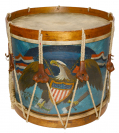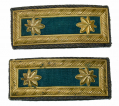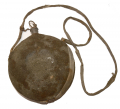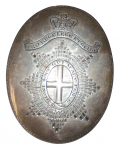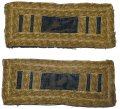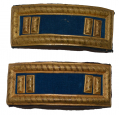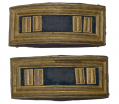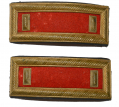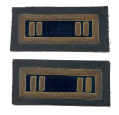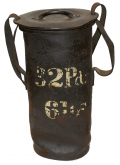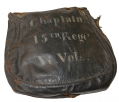site search
online catalog
Military Accoutrements
Showing 121 to 140 out of 380
A PRE-CIVIL WAR PAINTED EAGLE DRUM
A red paper label on the interior of this drum that reads, "KLEMM & BROTHER IMPORTERS OF MUSICAL INSTRUMENTS 275 MARKET ST. PHILADELPHIA", allows us to date the drum 1854 to 1857 inclusively. The… (2024-1209). Learn More »
PRE-CIVIL WAR MILITIA CANTEEN WITH STRAP
This smaller canteen matches pre-Civil War varieties in size and construction, holding a modest amount of water for occasional drill and light duties. All soldering remains strong, while the tin body… (2025-2039). Learn More »
EXCELLENT CONDITION SCARCE SMITH PATENT INFANTRY MAJOR STRAPS WITH A SUBTLE, ELEGANT TOUCH
Infantry field officer’s straps are scarce simply from the numbers involved: only one colonel, lieutenant-colonel and major to thirty line officers in a regiment at a time, and far less turn-over.… (410-907). Learn More »
1839 PATTERN U.S. INFANTRY WAIST BELT PLATE ON A WHITE BUFF LEATHER BELT
Standard issue 1839 pattern enlistedman’s white buff leather belt with a typical, large US buckle. The belt is 1.75” wide and approximately 38” long. The leather shows light use, with the… (490-7405). Learn More »
MODEL 1851 NCO WAIST BELT WITH BELT PLATE
Civil War era non-commissioned officer’s belt buckle on original bridle leather waist belt. Cast brass eagle buckle which has a one-piece applied German silver wreath and has the narrow 0.5” wide… (490-7404). Learn More »
M1851 ENLISTED MAN’S SWORD BELT - KNOX FAMILY, FREDERICKSBURG, VA
This model 1851 enlisted man’s sword belt came from the collection of Civil War relics and family mementos retained by the Knox family of Fredericksburg, VA. The family was large, prosperous, and… (1262-01). Learn More »
M1858 CANTEEN WITH COVER, SLING, & STOPPER FROM G.A.R. POST 551, YORK SPRINGS
This is a terrific old battlefield “pick-up” or “barn find” Civil War canteen. It is the M1858 “smooth side” canteen with pewter spout and three shoulder strap brackets. It is completely… (1202-866). Learn More »
RARE WHEN ON LEATHER (COMMON) CONFEDERATE "WISHBONE" BUCKLE
Our Mr. Steven Roger's writes, "One of the more distinctive Confederate belt buckles is the frame pattern with a movable spit tongue sometimes called the “forked tongue” or “wishbone” pattern.… (1268-017). Learn More »
FRENCH HORSE ARTILLERY 3-PIECE BELT PLATE
This silver(ed) bronze buckle is the rare "Modèle d'août 1830" a design created during "The July Monarchy". In 1830, the discontent caused by Charles X’s authoritarian policies culminated in an… (2025-959). Learn More »
M1859 NAVAL BOARDING AX COVER
Offered here is the black bridle leather cover for a M1859 naval boarding ax. Not a piece commonly encountered. Main body is made of one piece, folded at front edge, and sewn along bottom edges and… (1268-1227). Learn More »
BRITISH STERLING SILVER ROYAL HOUSEHOLD OR LIVERY SWORD BELT PLATE
Made for a uniformed Royal servant of King George III by Peter Carter of London, England in 1794. The plate is beautifully hand engraved with the Order of the Garter and motto: "HONI SOIT QUI MALY… (2025-845). Learn More »
CIVIL WAR DOUBLE ROW CAPTAIN OF INFANTRY SHOULDER STRAPS
A good set of Civil War embroidered bullion officer’s shoulder straps for a Captain of infantry. As with all officer material they would be privately purchased by the officer from a military goods… (490-7389). Learn More »
SMITH PATENT CAPTAIN OF INFANTRY SHOULDER STRAPS
A great looking set of Smith patent shoulder straps for a Captain of infantry, showing medium blue velvet centers with good color and surface, and muted, but strong gilt to the single row borders and… (490-7379). Learn More »
DOUBLE BORDER SMITH PATENT CAPTAIN OF INFANTRY SHOULDER STRAPS
A very good set of Smith patent shoulder straps, showing just appropriate age and wear. The borders and rank bars show some rubbing to the gilt finish and consequent slight darkening with some stains… (490-7378). Learn More »
LEATHER SHOULDER SLING FOR CIVIL WAR INFANTRY CARTRIDGE BOX
This is the bridle leather shoulder sling to support the infantry cartridge boxes of the Civil War. Black leather is approximately 2” wide and 61” long overall. There are two pairs of small cuts… (490-7399). Learn More »
$395.00
ON HOLD
SMITH PATENT FIRST LIEUTENANT OF ARTILLERY SHOULDER STRAPS
These Civil War officer’s shoulder straps are in great condition and have strong color. These are for a First Lieutenant of artillery, having a red wool ground, with a single rank bar at either end… (490-7383). Learn More »
CIVIL WAR EMBROIDERED BULLION INFANTRY CAPTAIN SHOULDER STRAPS
A very good, unused set of infantry captain’s shoulder straps. These retain their black enameled paper backs showing some minor losses, but no indication of having been turned under to sew them to… (490-7380). Learn More »
8th NEW YORK INFANTRY VETERANS MEDAL AND INSIGNIA – BLENKER’S VETERAN VOLUNTEERS
The 8th New York State Volunteer Infantry holds an interesting distinction among Federal regiments. In April of 1862, as the war heated up in Virginia, the 8th found themselves short of rations. … (2025-863). Learn More »
VERY GOOD 1864 DATED US NAVY YARD MARKED PASS BOX FOR THE 32 POUNDER GUN
The 32-pounder was an iron smoothbore cannon used on ships and in coastal fortifications. It was largely superseded by more advanced guns during the war but remained in service throughout, with the… (1268-669). Learn More »
CIVIL WAR VERMONT CHAPLAIN’S HAVERSACK WITH GREAT PAINTED IDENTIFICATION: 15th VERMONT, SECOND VERMONT BRIGADE
Material related to Civil War military Chaplains is extremely hard to find. This is a commercially produced “officer’s style” haversack with a great stencil in white on the reverse indicating… (2025-1851). Learn More »
Showing 121 to 140 out of 380
Most Popular
Historical Firearms Stolen From The National Civil War Museum In Harrisburg, Pa »
Theft From Gravesite Of Gen. John Reynolds »
Selection Of Unframed Prints By Don Troiani »
Fine Condition Brass Infantry Bugle Insignia »
featured item
AN ASSEMBLAGE BOTH WAR AND POST WAR OF A GETTYSBURG "WOLVERINE” – WILLIAM H. DUNN, 5TH AND 10TH MICHIGAN CAVALRY
William H. Dunn of Ganges, Michigan served in both the 5th and 10th Michigan Cavalry during the Civil War. He enlisted on Aug. 14, 1862 in Co. "I" 5th Michigan Cavalry. At Gettysburg Dunn, a trooper in the famous charge lead by Custer, gallantly… (1268-779). Learn More »



